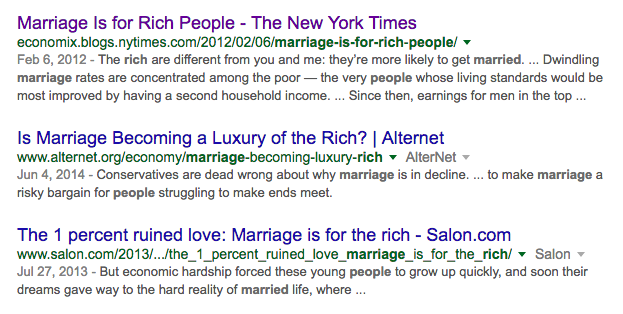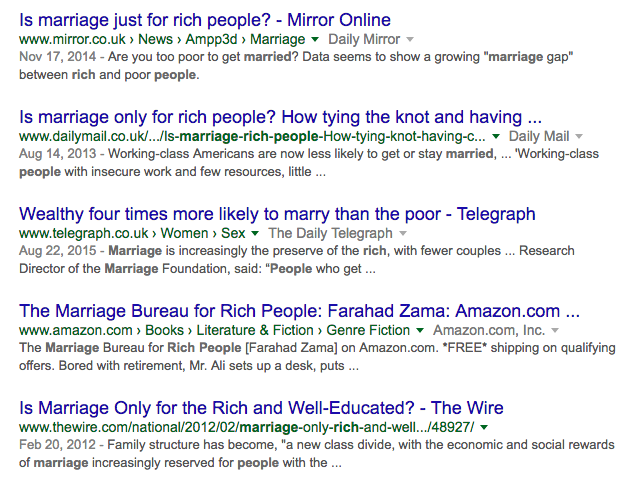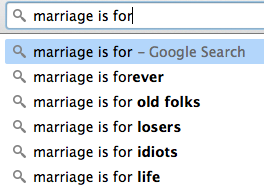Is Hook-Up Culture Only For Rich People?
“Students have more important things to worry about than boozy sex”

First the media broke the news that marriage was only for rich people.

Now, according to a well-researched #longread in Fusion by our friend Nona Willis Aronowitz, it may be that hook-up culture is only for them too. In college, at least, students who have to pay their own way can’t afford the kind of party-hard lifestyle that freaks out the older generation.
For the school’s 23% of out-of-state students who can afford the nearly $24,000 tuition, [Arizona State is] a place not only to get a degree, but to embrace their newfound freedom by going out and making out.
Then there’s the half of ASU’s student body who rely on need-based financial aid to afford the $9,500 in-state price tag. These students have more important things to worry about than boozy sex. …
“The media narrative of hookup culture is all centered around unlimited time and money and activities that require independence from family,” says Rachel Allison, an assistant professor of sociology at the University of Illinois at Chicago, who led a study on this topic. It’s not that working-class students don’t have sex at all, they’re just having a lot fewer of the alcohol-soaked, no-strings-attached rendezvous that take place in a hedonistic, privileged campus bubble.
What with having to live at home and/or hold down a job and/or raise children in addition to studying, and especially when you factor in the 10 million mostly lower-income students attending community college rather than on-campus four-year programs, NWA argues, “it’s hard to overstate the cockblocking power of a working-class life.”
To what degree is hook-up culture on campus the prevailing norm? According to an expert quoted in the piece, “it’s really just a small proportion of students having lots of casual sex, presumably the ones with the most time and resources on their hands.” Including, one assumes, the resources to deal with birth control and/or the ramifications of unplanned pregnancy so as not to let early parenthood take over and determine the rest of one’s life.
Besides, drugged-up, black-out hook-up culture is hardly the pinnacle of civilization to which most of us want our children to aspire.
Still, if many of your classmates wind down by hooking up, it matters that partying is expensive. (You usually have to dress up to go out; you may have to pay for your own food and drink as well as someone else’s or be labeled a mooch.) If you don’t participate in your college’s social scene, your stock can plummet. You also miss opportunities to make the kind of connections that can help you after you segue into the real world.
Here’s one very minor example. Yesterday I was feeling kind of proud of myself for helping out three different people. Great, someone told me in response, but how many of those people weren’t privileged to begin with? The three people I gave little boosts to were all white dudes from my community. This is how systems perpetuate themselves: people like me, who are well-meaning and friendly, give advantages to people who ask; and the people who ask are so often other people like me.
Would I happily lend a hand to someone who’s not like me? Sure, and I have, when approached. But that happens far more rarely. Most of the people I know are people like me, so most of the people I help are people like me. That may be sobering but it’s sadly common. Remember Maureen Dowd’s piece about the sad state of women in Hollywood?
That kind of leap — from indie to blockbuster — is almost exclusively reserved for young guys in baseball caps who remind older guys in baseball caps of themselves.
NWA concurs:
Partying hard while looking hot keeps a woman on the social radar, and a strong network of people with social capital means better jobs and internships. Students who, say, join Greek life (another cost-prohibitive activity) have a ready-made career pipeline when they graduate.
When we only socialize with people like us, we end up with fewer and less diverse connections. We also become more likely to marry people like us: economists call it assortative mating, and it perpetuates inequality.
Is this yet another way our world is stratifying, with the middle and upper-classes separated from the working classes like on the Titanic? How will the Jack and Rose of today ever get to meet and fuck and fall in love, possibly in that order?
Bonus Google results screenshot:

And second bonus screenshot:

Support The Billfold
The Billfold continues to exist thanks to support from our readers. Help us continue to do our work by making a monthly pledge on Patreon or a one-time-only contribution through PayPal.
Comments